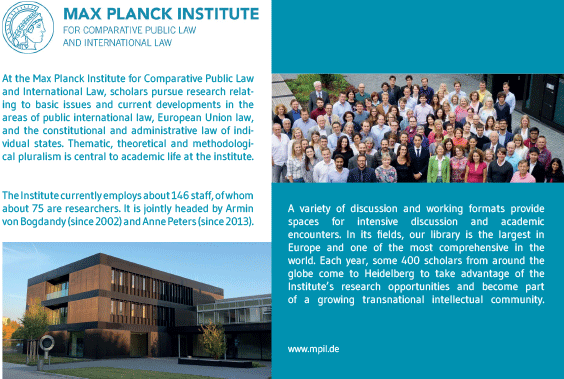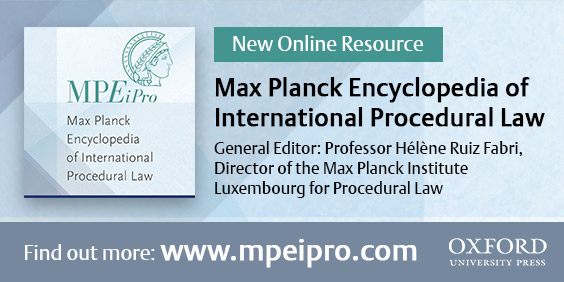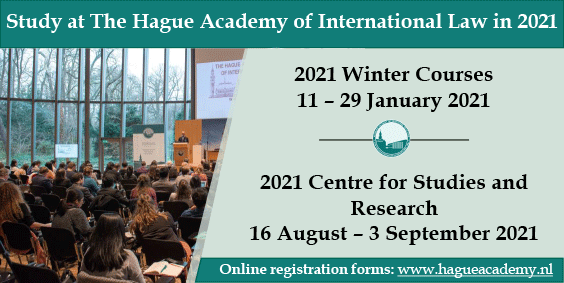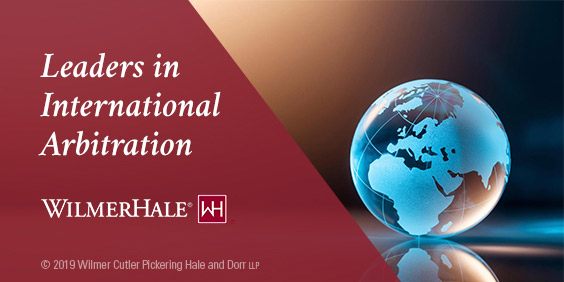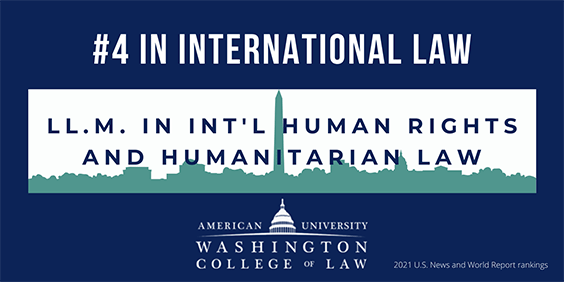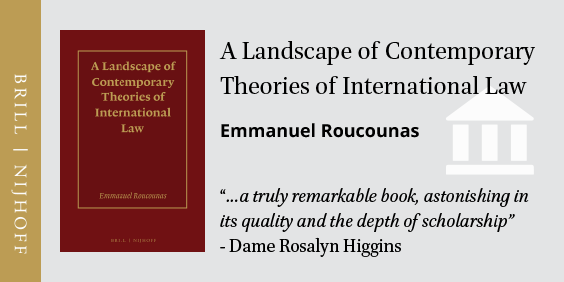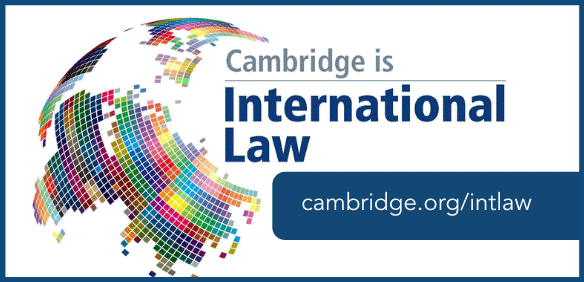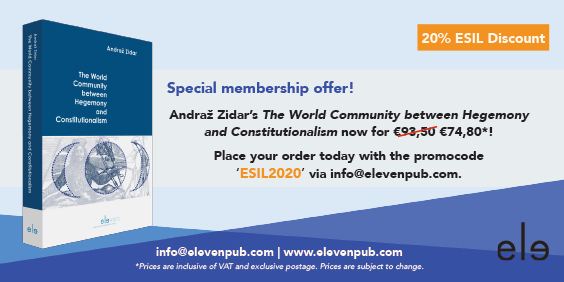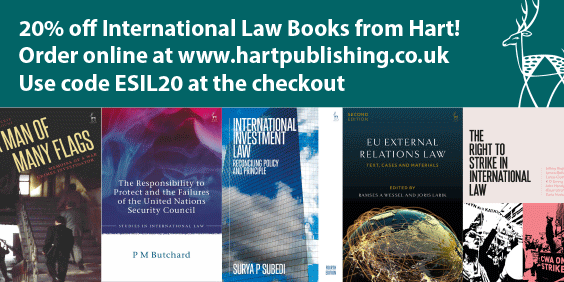ESIL Newsletter: March 2020
Editor: Sandrine Maljean-Dubois (University of Aix-Marseille)
 In this issue
In this issue
1. President’s Message
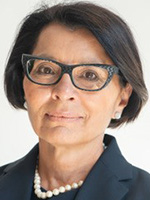
Photini Pazartzis
As you are all well aware, the world has been closely monitoring the COVID-19 situation, which is spreading across the globe. The impact of the coronavirus on the academic community(ies) has been felt, as Universities and academic institutions are moving to virtual teaching, online courses, and postponement of academic gatherings and events.
In view of the rapidly evolving situation in Europe, the ESIL Board at the suggestion of and in cooperation with our Italian colleagues, decided to postpone the Annual ESIL Research Forum, which was to be held in Catania, on April 23-24. This decision was taken in view of the situation to date in Italy, in particular, and the health and travel restrictions already put in place in many parts of Europe. I would like to thank Adriana di Stefano and the Catania team and Fulvio Palombino for all their efforts up to now and for helping us to take the inevitable decision we had to make. A good bit of news is that our colleagues in Catania have already found a later date to hold the Forum, so please note the new dates: October 29-30, 2020. Of course, speakers will be notified of this change and, hopefully, will be able to adjust their schedules accordingly. The organizers will try to keep the programme in its initial form, to the extent possible, and will keep everyone up to speed.
With the turn of events, the theme of solidarity appears as pertinent as ever, and the responses of the international community to global health crises will most probably add some food for thought to the Research Forum. We should also, as a community, explore alternative ways for communication and coming together; the ESIL Board has already been discussing ways to reduce carbon footprint, even before this recent health challenge. Any suggestions and ideas from ESIL members are welcome.
The Society is continuing to develop its activities and reinforce its links with our network of partners. In February, I was invited, in my capacity as President of ESIL, to the RUDN University (Moscow), one of our institutional members. On that occasion, I had the opportunity to meet with a number of colleagues from Russian Universities and present the work of our Society and to convey a message encouraging scholars from Russia to become more actively involved in our activities. I would like to thank Professor Aslan Abashidze and his team for organizing this meeting and look forward to enhancing cooperation with academic institutions and colleagues from the region.
Despite the current challenges, our Society is continuing its activities, and please remember to use our website both to stay informed of our activities, and to share your news. Many thanks to our Secretariat in Florence, working under difficult conditions to keep everything going!
Photini Pazartzis
2. Guest Editorial: Trump’s Legacy in International Law

Marcin Menkes
In 1919, Leonard Raven-Hill published the famous “The Gap in the Bridge” cartoon: Uncle Sam is dozing on the keystone of the span representing the unfinished League of Nations. A century later, the question of whether Donald Trump will secure his re-election looms over the international arena. It is a good moment to consider the implications of this presidency on the international legal order and to prepare for whatever outcome.
Short-term overreaction. A lot has been written about the short-sightedness of Trump’s foreign policy, especially in its early months. The criticism often took dramatic tones. How can long-term allies ever trust the US again after being labelled a national security threat and targeted with sanctions? How can international organisations rely on the US after its financial blackmail? Such criticism often voiced rejection of the rhetoric accompanying the American policy decisions rather than convey its realistic assessment.
If Trump’s term turns out to be merely an anomaly in US foreign policy, its allies will not have much choice but to bury the hatchet. The havoc wreaked by Trump may even have limited benefits for multilateralism: the shock therapy imposed upon the US allies may cure them of ‘rally ’round the flag’ syndrome and compel them to pay greater attention to each other. The increased military spending forced by Trump on other NATO members is an example.
The blind spot. What seems largely ignored is the deeper significance of Trump’s presidency. To name two examples: Ukraine and Iran. The impeachment proceedings culminating in almost a fully partisan vote showed how the administration had compromised the security of Ukraine (and that of all of Russia’s neighbours) and fundamental principles of international law for the personal benefit of the president. Renewed tensions with Iran started as the primus inter pares violated the UN SC resolution and then arbitrarily imposed sanctions on both Iran and third states. Why are these disappointments any different?
The honesty of US-led idealism has long been questioned, and movies like ‘The Post’ (2017), ‘Vice’ (2018) and ‘Official Secrets’ (2019) further eroded that credibility. Yet, overall the US has maintained its reputation as the ‘leader of the Free World’. This underpins the legitimacy of the US-led promotion of the Western vision of international law, for instance, with regard to human rights, investment protection, and international security. As Pierre Marie Dupuy recently wrote: States are no longer looking to either the vocabulary or the norms of current international law to justify their actions. The benefit of the ‘time of innocence’ for the US-led model thus evaporates. The Ukrainian and Iranian cases entail a rejection of both multilateralism and US leadership.
Eventually, we will witness the intersection of three phenomena. The credibility of key advocates of the communitarian vision of international law and restrictive approach to sovereignty is waning. Anti-globalisation and anti-democratic moods continue to rise. These two factors could favour an Eastphalian approach to international law if it wasn’t for the new challenges to sovereignty like climate change, shifting paradigms in warfare, or the emancipation of cyberspace from state control.
While Uncle Sam may still cling to the keystone, the question is whether the communitarian bridge hasn’t been forfeited in the process.
3. 2020 Research Forum
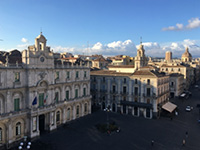
In light of the serious concerns related to the global spread of COVID-19, the ESIL Board and the local organisers of the Research Forum have decided to postpone the upcoming Research Forum in Catania, which was due to take place on 23-24 April. The event will now be held on 29-30 October 2020.
The local organisers will try to keep the programme as it currently stands and will inform speakers and participants of the new logistics in due time. For further assistance or information, please visit the Catania Research Forum website or contact: 2020esil.rf.catania@lex.unict.it
4. 2020 Annual Conference

Preparations for the ESIL2020 in Stockholm are well underway. Speakers and chairs have been invited, agora papers have been selected and submitters will be informed of the outcome by the end of March. The preliminary programme is now available on-line and will be updated. Interest Groups have booked rooms for pre-conference workshops on Wednesday. Find further details on the conference website, where you can also find the registration platform and information about accommodation options.
Conference highlights include:
- 20 different panels with more than 60 presentations by, inter alia, Martti Koskenniemi, Francesco Francioni, Concepcion Escobar Hernandez, Dire Tladi, Ana Salinas, Andrew Clapham, Anne Orford and Mikael Rask Madsen.
- The award of the ESIL Book Prize and the ESIL Young Scholar Prize
- A conversation with the winner of the 2019 ESIL Book Prize
- Pre-conference ESIL Interest Group workshops on Wednesday 9 September
- Book exhibitions by ESIL institutional members and other exhibitors
- ESIL Mentoring Session for early-career scholars
- A meeting with the editors of EJIL and selected journals.
- Lunchtime meeting of the editors of International Law journals
- A reception at the magnificent City Hall and conference dinner at the München brewery.
We hope to see many ESIL members, old and new, at this year’s conference. Register now to be sure of a place.
5. ESIL Teaching Corner
Please support the ESIL Teaching Corner, an online resource developed so that ESIL members can share syllabi, module outlines, reading lists, and other international law teaching tools. We have developed the Teaching Corner to encourage the dissemination of good practices, and especially to provide support for early career researchers who may be designing a course for the first time. Of course, whomever wishes to find some inspiration on the teaching of international law is warmly welcome. By seeing the innovations and ideas of others, we hope to nurture and inspire innovative teaching both in Europe and beyond. You will find materials here that might prove innovative or useful both in relation to substance as well as form (for example, in relation to assessment, or how to structure a course relating to international law mooting).
Please contact the ESIL Secretariat for more information on how to access and submit resources.
6. ESIL Events – First ESIL Skype Event
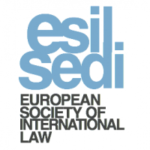 An initiative by the Interest Group on International Courts and Tribunals
An initiative by the Interest Group on International Courts and Tribunals
On the 10th of February 2020, the Interest Group on International Courts and Tribunals organized its first Skype-based doctoral workshop, the first of its kind for the European Society of International Law. The initiative built on the Skype workshop previously organized by one of the interest groups of the Asian Society of International Law. The convenors also received assistance from the Max Planck Institute Luxembourg for Procedural Law, who generously agreed to host the event.
Given our hope that more and more events organised under the auspices of the ESIL would be held online, we would like to share some guidelines that may help future organisers. The first problem we faced was to choose an appropriate platform for the workshop. In order to make the workshop workable, you would have to use Skype Business, instead of a regular Skype conference call. While Skype Business allows up to 250 guests to join the virtual room, it entails subscription costs and requires a large bandwidth. Nevertheless, we decided to use it for our workshop, and it worked quite smoothly thanks to the solid infrastructure of our host institution. There are however several alternatives to Skype, such as Zoom, Lifesize, BlueJeans, WebEx, and GoToMeeting, to name a few, each with their pros and cons.
One month before the event, we released a call for ‘engaged listeners’ who wish to join the virtual room as guests and to ask questions to the speakers via written messages. We published a registration form on our website (igict.wordpress.com) asking for the names and email addresses of potential engaged listeners. This was the only kind of information we needed as we invited participants to join by sending them a link to their email addresses. Organizers will however have to inquire on the kind of information they need from guest participants as it might change depending on the chosen platform.
Concerning audio and video guidelines, it is of course useful to test the connection with the speakers prior to the event in order to assess the quality of their audio and video hardware. This might prevent problems linked to bad microphones (the use of headset microphones is to be preferred) or blurry cameras due to the use of privacy stickers. It is vital that organizers require participants to mute their microphone and disable their camera when joining the event in order to avoid disruption and distraction for the speakers, and more generally, the risk of absolute confusion among participants. Questions were sent via written message, and read to the speakers by the chair. As speakers also had access to written questions, it might be confusing for them to read and listen to the question at the same time. A way out could be to ask the speakers to focus only on the chair and avoid reading the question at the same time.
We asked the speakers for feedback about their experience during the workshop, and they gave a few suggestions. It had, for example, been suggested to allow speakers to have on-camera not only the other speakers and the chair, but also the public attending the event, as it was the case at the MPI Luxembourg. It would allow the speakers to have a better understanding of how participants in the room react, and make the experience closer to a live event.
We hope that this information will be useful for organizers of future online ESIL events, and we take this occasion to invite you to our second online doctoral workshop to take place in October-November 2020. Further information on this will follow in due course.
Edouard Fromageau, Andrea Gattini, Machiko Kanetake and Stephan Wittich
7. News from Interest Groups
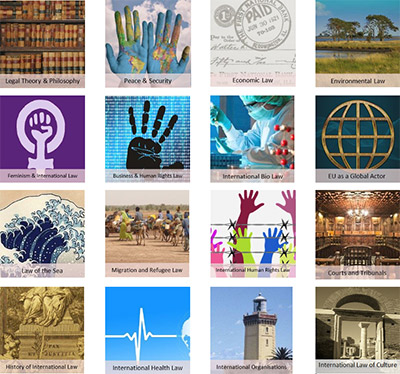 ESIL Interest Groups are a vital part of the Society’s success and activities. A list of the groups is available on the ESIL website. Reports of recent activities and upcoming events are available in the full text of the Newsletter.
ESIL Interest Groups are a vital part of the Society’s success and activities. A list of the groups is available on the ESIL website. Reports of recent activities and upcoming events are available in the full text of the Newsletter.
New Interest Group on the International and European Rule of Law
We are delighted to announce the formation of the new ESIL Interest Group on the European and International Rule of Law. The IG offers a dedicated forum for all ESIL members interested in the inter-, supra- and transnational dimensions of the rule of law. We warmly invite all ESIL members to join the IG and to work together on an ambitious research agenda, covering theoretical, conceptual and cross-cutting questions as well as specific issues in international and European institutions and integrated multi-level governance structures. The IG’s inaugural event will take place at the 2020 Annual Conference in Stockholm.
For more information, please visit the ESIL website IG page.
Last but not least, please encourage your colleagues to join the ESIL network: the Join ESIL button is clearly visible on the ESIL website home page.
Interest Group on International Organizations
We were pleased in January of this year to welcome Lorenzo Gasbarri (Bocconi University) and Gail Lythgoe (University of Glasgow) to the coordinating committee. Lorenzo and Gail will serve a 4-year term. Catherine Brölmann (University of Amsterdam), Richard Collins (University College Dublin) and Sufyan El Droubi (University of Dundee) will continue to serve on the coordinating committee for a further 2 years. We are currently working on plans for the year ahead, including for the 16th ESIL conference in Stockholm – watch this space!
Please continue to visit our blog and follow us on twitter @ESIL_IntOrg.
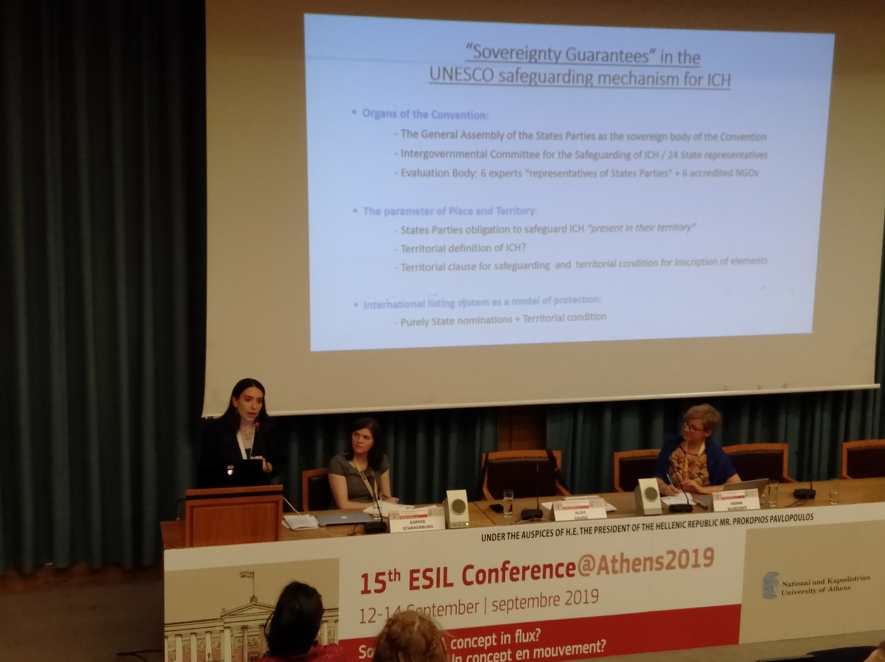 Interest Group on International Law of Culture
Interest Group on International Law of Culture
The IG on International Law of Culture was created at the 2018 ESIL Conference (Manchester). The agora ‘Culture As or Against Sovereignty’ proposed by the IG was included in the programme of the 15th ESIL Annual Conference in Athens (September 2019). A pre-conference workshop was organized around the issue of ‘Approaches to Culture and Sovereignty in different areas of International Law’. A workshop on “Searching Solidarity for Fighting against Cultural Exclusion towards Migrants and Refugees in Europe in Times of Populism” will take place in the 2020 ESIL Research Forum, University of Catania (October 2020).
